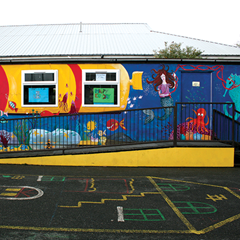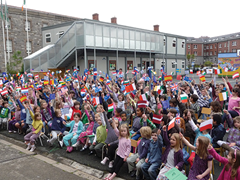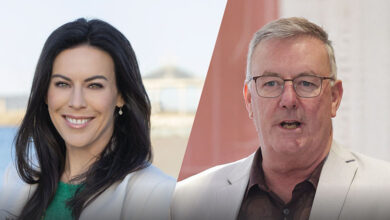Griffith Barracks primary school
 As Education Minister Ruaírí Quinn seeks to create a more pluralist primary sector, Meadhbh Monahan visits an inner-city Dublin multi-denominational school where acceptance of other faiths and culture is “second nature” to pupils.
As Education Minister Ruaírí Quinn seeks to create a more pluralist primary sector, Meadhbh Monahan visits an inner-city Dublin multi-denominational school where acceptance of other faiths and culture is “second nature” to pupils.
“Multi-denominational is definitely the way people want to go,” states Sinead O’Kane, principal of Griffith Barracks multi-denominational primary school.
Situated in the old barracks on the Griffith College site, the primary school caters for 249 Irish and international students. Initially set up in Crumlin in 1994 by a group of parents, the school moved to the inner-city site in 1997 to cater for the diverse community living there. It is affiliated with the Educate Together organisation but has an elected independent patron executive (i.e. parents). Since 2000, as the school has expanded, pupils have been taught in pre-fab classrooms, with the old barracks building now housing offices, a staff room and the library. The principal believes that the entire education system is “greatly underfunded.” However, there is “some light on the horizon” in that a new 16-teacher school on the same site has been scheduled for the Government’s 2014-2015 building programme.
Griffith Barracks’ mission statement reads: “Within our strong school community, we provide a high standard of education and, with parental involvement, we work towards creating a learning environment which builds confidence and empowers children.” It strives to be “welcoming, respectful of difference and aware of environmental and social issues.”
Ms O’Kane tells eolas: “We teach the children about Christianity, Islam, Judaism, Buddhism, Hinduism, humanism and agnosticism.” At the moment there are pupils from Jewish, Buddhist, Muslim, Christian and atheist families in the school. Staff “are expected to embrace what we teach here” but are not questioned on their religious beliefs.
Parents are very involved, and can “come in and out at their leisure” e.g. they often take reading time, art and after school yoga or cook international food for events such as Europe Day.
“It is great that they are so involved but does cause us problems because sometimes some parents over-step the mark; but for the most part they are very respectful,” Ms O’Kane comments.
Griffith Barracks teaches the national curriculum but, instead of half an hour each day for religious instruction, it teaches an ethics education programme.
“We don’t instruct any religion,” Ms O’Kane explains. Rather, children learn “a little about each religion.” Staff also teach respect, “which is at the heart of everything we do here,” she says.
Teaching includes trips to a Buddhist centre, a synagogue, a mosque and Catholic and Protestant churches. “We insist that they all go to every place even though they say: ‘I don’t believe in that.’” Students are encouraged to take a look “out of interest and respect.” As a result, “it’s absolute second nature to them.”
The ethics programme is divided into three sections: personal and social development; equality and justice; and beliefs, religions and festivals. It “gives expression” to the four fundamental principles on which the school is organised i.e. being child-centred, multi-denominational, democratic and co-educational.
“For me, it’s about feelings, empathy, an awareness of other people, an awareness of self,” the principal reflects.
By following Amnesty International’s ‘Right Start’ programme, pupils begin learning about ethics when they are junior infants. Lessons include ‘my happy voice’, where they explore what their voice is, its function and how they can use it to do positive things. “This is to get away from the fact that people will say unkind things and be abusive,” Ms O’Kane explains. Drama is used to promote equality, with pupils learning that “they are all equal [and] are all entitled to a fair chance.”
 Outside of school, pupils have come across discrimination and have reported back to their principal.
Outside of school, pupils have come across discrimination and have reported back to their principal.
“A child spoke to me recently and told me he had stones thrown at him on the way home from school because he is black.” A Muslim mother, who wears a veil, told her of an incident where she too had stones thrown at her as she walked past the school with her children, with the youths saying: “Get out of this country.” Ms O’Kane states: “That is just shameful and terrible because the children hear it and it affects them too.” Incidents like this give her more impetus to persevere. “You just teach the children that this is wrong,” she reflects.
Learning and practising the democratic process is important in Griffith Barracks. A ‘student Dáil’ allows pupils to voice their concerns and requests. It consists of two students from each class from 2nd class to 6th class (i.e. 7 to 12-year-olds). While the most common request has been for more play time, staff have granted requests such as benches in the play area, basketball and skipping at play time and a separate area for sixth class.
During the presidential election they had a ballot box and each student learned about voting and cast their vote. Michael D Higgins was the victor. The school hall also features wall presentations on how Europe works, an increasingly important issue for future Irish citizens. The European Parliament and Commission are explored by the older students, while the younger pupils have researched the flags, currencies and famous people from across Europe. The school also has a ‘green council’ which encourages paper recycling, water conservation and composting.
“The children in this school are very vocal and opinionated because we put emphasis on listening to others,” according to Ms O’Kane. A weekly assembly also encourages public speaking as the children celebrate, explain and perform dramas about various festivals e.g. Chinese New Year, St Brigid’s day, the Hindu spring festival Holi, the Passover, Easter and Ramadan.
On the Education Minister’s moves towards creating a pluralist primary school system, Ms O’Kane says: “I think he really has no option because that’s the way the world is going. For example, our school has 250 people on the waiting list for the year and we only have 28 places. There is a huge demand for this type of school.”
Irish society is “moving towards the European model [where] people like the no-uniform policy, the use of first names [for teachers].”
“People think we are a bit wacky,” she laughs. However, while “there is a bit of smugness about Educate Together … a lot of other teachers will say: ‘We do that anyway in our school.’” Depending on the area, “Catholic faith schools are as multi-denominational as us,” she concludes.





